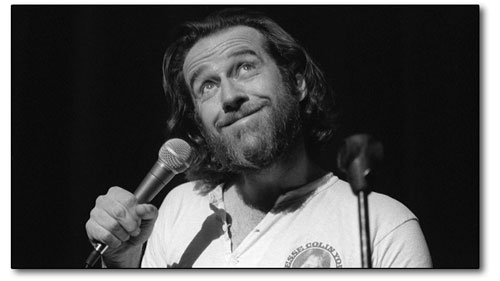
Carlin’s stuff
– May 12, 1937 - June 22, 2008
In Las Vegas if you stare up from the Strip toward all the flashing screens announcing which of the eternally recycled performers will be appearing, it’s easy to come to the conclusion that, sadly, there is no new talent alive in America. At least not in Las Vegas. I mean, there’s always Wayne Newton, Siegfried and a bit of Roy, Celine Dion, the David Copperfield magic act, and Cher, the performer whose name doesn’t take up a lot of space on a marquee. Not only are these entertainers not new, their announcements are beginning to read like epitaphs.
I remember decades ago when I noticed George Carlin was going to appear on the Strip. I wanted so badly to see his show, but the bank wouldn’t loan me the money for a down payment on his tickets. I had to settle for a recording I purchased at a second-hand audio store. I listened to him all the way home and just laughed, his imagined presence resting so lightly on the seat beside me in the little hybrid I drove.

It’s difficult to believe nearly eight years have passed since George Carlin passed. And what a strange word for dying, Carlin might have observed, to say someone has “passed” – as if a life has just accelerated out of reach. Carlin achieved a kind of fame just for his word lists, many of them containing euphemisms, and now the man himself has been euphemized. What a way to go.
Any writer or serious reader can appreciate Carlin’s fascination with the English language. As a boy, he repeatedly asked his mother what any number of words he didn’t understand actually meant. Every time he asked, she supposedly replied, “Go look it up in the dictionary.”
His controversial 1972 list of “Seven words you can never say on television” led to an FCC censure against the New York FM radio station that aired Carlin’s “filthy words.” Eventually the U.S. Supreme Court weighed in on the matter, voting in a 5-4 majority to uphold the FCC’s authority to prohibit this kind of speech from the public airwaves, especially during broadcast hours when children might be listening. The court went so far as to offer a semantic distinction, that the words are not “obscene,” just indecent. I’d offer Carlin’s list for your edification, but here it is, 2016, and those words are still taboo on American broadcast television and in most print, so you’ll have to look them up yourself if you’re interested.
How odd that Carlin regularly discussed death in his stand-up performances. He said, “Death is caused by swallowing small amounts of saliva over a long period of time.” He also said, “I’m always relieved when someone is delivering a eulogy and I realize I’m listening to it.” George, you should be ecstatic, because you don’t have to listen anymore. You are in that strange place where jokes go after they are told, their impact still felt, an echo of laughter eternally bouncing across the universe, but their punch lines forgotten.
Perhaps becoming cynical as we age cannot be helped, but to lose our humor makes us unbalanced. The news, for instance, can’t help reminding all its listeners of the tragedies and the dying, or that the number of people 65 or older is expected to double in the next three decades. Anticipating that looming threshold, Carlin claimed that by 2011 we’d refuse to refer to ourselves as the elderly. He suggested we call ourselves the pre-dead.
I think the man just grew wiser, and I own a bit of the man. Actually, it’s just a book with his signature scrawled on the title page, one of my prime possessions that rises above Carlin’s now infamous nomenclature, that our possessions are “just stuff.” I found it at a thrift store, a first edition copy of When Will Jesus Bring the Pork Chops. Someone tossed it out, possibly offended by the humor, and I’m certain that even dead, Carlin can still offend. It was his nature; he believed any artist must continually cross the line. Noted for his social criticism, he poked many sensitive subjects squarely in the eye, and he had a knack for laughing black.
Seventy-one years on this planet and he still exists on many YouTube videos, audio recordings and in books that are easy to find. If he has anything more to say about the world or religion, given his current perspective from the afterlife, it’s still a mystery to me, though more than likely it would be very funny.
I’m hoping to get to his afterlife performance, eventually, but I’m going to be more than a little miffed if it still requires cash to get in the door.
– David Feela
In this week's issue...
- December 18, 2025
- Let it snow
Although ski areas across the West have taken a hit, there’s still hope
- December 18, 2025
- Look, but don't take
Lessons in pottery theft – and remorse – from SW Colorado
- December 11, 2025
- Big plans
Whole Foods, 270 apartments could be coming to Durango Mall parcel
